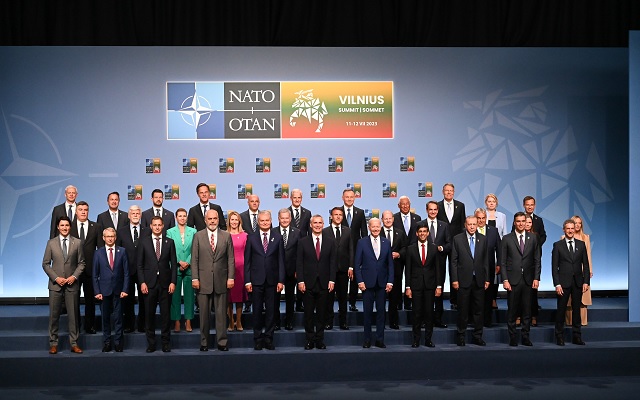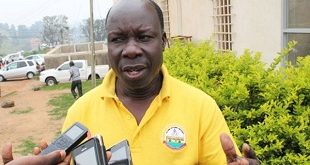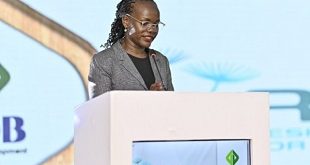
How did we come so late to the claim of Putin’s megalomania as the cause of European instability?
THE LAST WORD | Andrew M. Mwenda | NATO leaders meeting in Vilnius, Lithuania, have resolved that once the war in Ukraine ends, that country will be admitted into the alliance. Since the war began, the mainstream Western claim has been that the war was an “unprovoked” act of aggression by a “megalomaniacal” Russian president, Vladmir Putin, (some say by Russian imperialism) to recreate the Soviet (or Russian) empire. These views are presented as Biblical truths. Interestingly, since the beginning of debate on NATO expansion in 1997, a large cross section of very senior foreign policy leaders in the U.S. predicted that it will provoke a hostile and aggressive, if not violent, Russian response.
When NATO expansion was first proposed, top U.S. foreign policy journalist, Thomas Friedman, called George Kenan for a comment. Kenan enjoyed iconic status in U.S. foreign policy circles as an expert on Russia and the Soviet Union. His “Moscow Telegram” of 1948 made him the architect of the U.S. policy of containment of the Soviet Union during the Cold War. The interview was published in the New York Times of February 5, 1997.
“(Bluntly) stated…expanding NATO would be the most fateful error of American policy in the entire post-Cold War era,” Kenan said, “Such a decision may be expected to inflame the nationalistic, anti-Western and militaristic tendencies in Russian opinion; to have an adverse effect on the development of Russian democracy; to restore the atmosphere of the Cold War to East-West relations, and to impel Russian foreign policy in directions decidedly not to our liking …I think the Russians will gradually react quite adversely to it and it will affect their policies. I think it is a tragic mistake. There was no reason for this whatsoever. No one was threatening anybody else… It shows so little understanding of Russian history and Soviet history. Of course, there is going to be a bad reaction from Russia, and then (the NATO expanders) will say that ‘we always told you that is how the Russians are’ but this is just wrong.”
In June 1997, 50 U.S. foreign policy experts including former Secretary of Defense Robert McNamara, wrote an open letter to President Bill Clinton. “We, the undersigned, believe that the current US-led effort to expand NATO, the focus of the recent Helsinki and Paris Summits, is a policy error of historic proportions. We believe that NATO expansion will decrease allied security and unsettle European stability for the following reasons: In Russia, NATO expansion, which continues to be opposed across the entire political spectrum, will strengthen the nondemocratic opposition, undercut those who favour reform and cooperation with the West, bring the Russians to question the entire post-Cold War settlement, and galvanise resistance in the Duma to the START II and III treaties; In Europe, NATO expansion will draw a new line of division between the “ins” and the “outs,” foster instability, and ultimately diminish the sense of security of those countries which are not included…”
That same year, the last USA ambassador to Moscow during the Soviet era, Jack Matlock, was asked to testify before the Senate Foreign Relations Committee. “I consider the administration’s recommendation to take new members into NATO at this time misguided. If it should be approved by the United States Senate, it may well go down in history as the most profound strategic blunder made since the end of the Cold War. Far from improving the security of the United States, its Allies, and the nations that wish to enter the Alliance, it could well encourage a chain of events that could produce the most serious security threat to this nation since the Soviet Union collapsed.”
In his memoirs, William Perry, who served as Clinton’s secretary of defense said that “NATO enlargement is the cause of ‘the rupture in relations with Russia’” and that in 1996 he was so opposed to it that “in the strength of my conviction, I considered resigning”.
On June 20, 1997, Senator Joseph Biden, then a ranking member of the Senate Foreign Relations Committee and now president of the USA said: “I think the one place where the greatest consternation would be caused in the short term, for admission (into NATO) would be to admit the Baltic states now, in terms of NATO-Russian, US-Russian relations. And if there was ever anything that was going to tip the balance, were it to be tipped, in terms of a vigorous and hostile reaction in Russia, it would be that.”
When NATO integration of Ukraine and Georgia was proposed at the Bucharest summit of 2008, then U.S. Ambassador in Moscow, now director of the CIA, Bill Burns, sent a secret cable to then U.S. secretary of state, Condeliza Rice. “Ukrainian entry into NATO is the brightest of all red lines for the Russian elite (not just Putin). In my more than two-and-a-half years of conversations with key Russian players, from knuckle-draggers in the dark recesses of the Kremlin to Putin’s sharpest liberal critics, I have yet to find anyone who views Ukraine in NATO as anything other than a direct challenge to Russia’s interests … Today’s Russia will respond.”
As late as March 5, 2014, former U.S. national security advisor and also former U.S. secretary of state and also a world leading scholar on international relations, Henry Kissinger, wrote an opinion in The Washington Post. “If Ukraine is to survive…it must not be either side’s outpost against the other, it should function as a bridge between them…Ukraine should not join NATO. For its part, the United States needs to avoid treating Russia as an aberrant to be patiently taught rules of conduct established by Washington. Putin is a serious strategist on the premises of Russian history. Understanding U.S. values and psychology are not his strong suits. Nor has understanding Russian history and psychology been a strong point of U.S. policymakers. Leaders of all sides should return to examining outcomes, not compete in posturing.”
In 2015, Robert Gates, who has been director of CIA and later served as secretary of defense for both George Bush and Barak Obama, said in his memoirs, Memoirs of a Secretary at War, “Moving so quickly (to expand NATO) was a mistake. Trying to bring Georgia and Ukraine into NATO was truly overreaching (and) an especially monumental provocation.”
The reaction by Moscow to NATO expansion was predicted by all these U.S. foreign policy experts/leaders long before Putin became anything in Russia. How then did “Putin’s megalomania” become the explanation for Russia’s response to NATO expansion?
*****

amwenda@independent.co.ug
 The Independent Uganda: You get the Truth we Pay the Price
The Independent Uganda: You get the Truth we Pay the Price




The western n Anglo-Saxons are fighting to maintain dominance over the world.They have dominated it for the past 500yrs and still counting but slowly they are loosing it ,unfortunately they have to go down with a lot lives and distruction.
Like Martin Luther,I have a dream,when the world will be equal in all spheres of life.
Keep dreaming. Wouldn’t it be nice if we had a multilateral round table dispensation where say Thailand and China meet on equal terms
You seem to believe that the warnings from these experts somehow absolve Russia of its aggressive actions in Ukraine and other independent countries. You conveniently ignore the fact that it was Russia that annexed Crimea, fueled separatist movements in eastern Ukraine, and continues to threaten its neighbors with military force. But no, according to your wisdom, it’s all NATO’s fault for expanding its membership.
Perhaps youa missed the memo, but NATO expansion was a response to the changing geopolitical landscape and the legitimate aspirations of countries that wanted to join the alliance for their own security. It was not an act of aggression against Russia, as he seems to suggest. NATO has been a force for stability and security in Europe, and it is only natural that countries would seek its protection in the face of Russian aggression.
You would rather indulge in a revisionist history where Russia is the victim and NATO is the aggressor. It’s a narrative that conveniently aligns with the Kremlin’s propaganda machine, which has been working tirelessly to undermine NATO and sow discord among its member states.
The Kremlin must be proud.
1. There is no doubt that Eastern Europe has transitioned a lot after the fall of USSR;
2.USA and her NATO allies should have felt the political pulse of this region before blundering this much.First of all these nations have alot in common;they boarder each other;they speak the same language and practice the same religion.so even if Ukarine wins this war; how will USA ensure that the boarders are peaceful and who will foot the cost of the peace and reconstruction of Ukraine?
3.USA may aspire to have something similar to creating an “Israel” in form of Ukarine in Eastern Europe this may not be possible because Israel is powerful despite being in the middile of Arab states because nations like Palestine,Egypt,Iraq,Iran were not exposed to international wars like WWII and Israel’s army was trained by USA.
4.Most of Eastern Europe has states have suffered genocide in that;people from that region requires a lot of healing actually its Russia and Ukarine that have the biggest populations in Eastern Europe.
5.The Belovezha accord of 1991 that was signed by Presidents Boris Yeltsin of Russia ,Kravchuk of Ukraine and Susskerich of Berlalus resulted in the creation of CIS(Common Wealth of Independent States)their goal was to have a good neighbors and for adventurous economic and social cooperation i think it was unrealistic for Zelensky to have such a wild imagination of joining NATO yet its was not in the framework of Eastern Europe.
6.But why is Putin also afraid of joining NATO?after all he has the military muscle.Is it because he is the 2nd military power in the world so war is his passion?
7.The world had noted that North Korea and Russia have the most chaotic leaders if they are not monitored.
8.When should warring factions say enough is enough?No doubt that USA is a all rounder and every one wants to live the American dream cant they let go of this war?
9. The Ukarine -Russia war is not an ordinary war;because they are the biggest suppliers of oil and wheat to Africa and Asia actually that maritime zone is a big trade deal.
10. Putin risks being assassinated by his close associates and Generals.
11.isn’t this the right time and justification for a coup in Russia?When do the soldiers say enough?
12..Just mention the word gun;then you will see how 98% of the human race will freeze.One of my friends told me that the man she dated had a gun ;when i asked how she got to know; she told me that he hid the gun under her bed obviously she was so frightened that she wanted to tell the LC and inform the police.I asked her whether the gun was still under her bed she said no so i asked her what she was afraid of:she told me she realized that the man could be on the wanted list of government.I told her not to try and crack an egg before the law,at times lawyers advise their clients to reveal less so that the state does not have a field day in court.